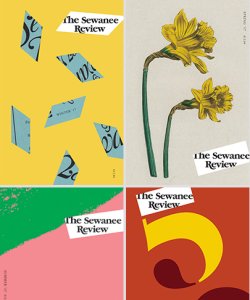John Green on Writing About Mental Illness, Diversity in Publishing, and More
Nnedi Okorafor’s fantasy novels reinvent the genre; how One Story ended up publishing Tom Hanks; 2017 ALTA award winners announced; and other news.
Jump to navigation Skip to content
Nnedi Okorafor’s fantasy novels reinvent the genre; how One Story ended up publishing Tom Hanks; 2017 ALTA award winners announced; and other news.
“If you read it, I hope you enjoy it.” In this short video, Tom Hanks sits in front of his collection of vintage typewriters to announce the publication of his debut short story collection, Uncommon Type: Some Stories (Knopf, 2017).

The country’s longest-running literary quarterly publishes its 500th issue with a new design, a new editor, and a new submissions platform, but the same old commitment to literary excellence.
Spartanburg, South Carolina–based Hub City Press has announced the C. Michael Curtis Short Story Book Prize, a new award of $10,000 and publication for a debut story collection by a writer residing in the American South. Acclaimed short story writer Lee K. Abbott will judge the inaugural contest.
Fiction writers living in Alabama, Arkansas, Florida, Georgia, Kentucky, Louisiana, Mississippi, North Carolina, South Carolina, Tennessee, Texas, Virginia, or West Virginia who have not yet published a book are eligible to apply. Submit a manuscript of 140 to 220 pages with a $25 entry fee by January 1, 2018. The winning book will be published in Spring 2019.
Betsy Teter, Hub City’s founder and publisher, notes that the new prize is “one of the most substantial short story prizes in North America,” and is named to honor fiction editor C. Michael Curtis, who “has been a great friend to Hub City Press over the years.” Curtis has edited notable American short story writers including Tobias Wolff, Joyce Carol Oates, and Anne Beattie.
Established in 1995, Hub City Press is dedicated to publishing works by emerging and established authors from the American South. Visit the website for more information.
Playboy’s literary editor shares her experiences; Image to publish Flannery O’Connor’s college journal; writers on their favorite cultural experience of 2017; and other news.
Parneshia Jones named board president of Cave Canem; William Logan accuses Jill Bialosky of plagiarism; Stephanie Danler’s Sweetbitter to be adapted for TV; and other news.
English novelist Kazuo Ishiguro, author of The Remains of the Day, has won the 2017 Nobel Prize in Literature. The Swedish Academy made the announcement today in Stockholm, remarking that Ishiguro, sixty-two, “in novels of great emotional force, has uncovered the abyss beneath our illusory sense of connection with the world.”
“If you mix Jane Austen and Franz Kafka, then you have Kazuo Ishiguro in a nutshell—but you have to add a little bit of Marcel Proust into the mix,” said Sara Danius, the permanent secretary of the Swedish Academy, which presents the award. “He is a writer of great integrity, who doesn’t look to the side. He has developed an aesthetic universe all his own. He is exploring what you have to forget in order to survive in the first place as an individual or as a society.”
Born in Nagasaki, Japan, in 1954, Ishiguro moved with his family to England in 1960. He received a bachelor’s degree from the University of Kent in 1978 and a master’s from the University of East Anglia’s creative writing program in 1980. He is the author of seven novels, beginning with A Pale View of Hills (1982), and is perhaps most well known for The Remains of the Day, which won the prestigious Booker Prize for Fiction in 1989 and was made into Academy Award–nominated film starring Anthony Hopkins and Emma Thompson. The novel, told from the perspective of an English butler in the years leading up to World War II, deals with ideas of loyalty, love, repression, and loss.
“Ishiguro’s writings are marked by a carefully restrained mode of expression, independent of whatever events are taking place,” the prize committee said in a statement. “At the same time, his more recent fiction contains fantastic features.”
Of his 2005 novel Never Let Me Go—which won the National Book Critics Circle Award and was also adapted into film—the prize committee remarked that Ishiguro had introduced “a cold undercurrent of science fiction into his work.” His most recent novel, The Buried Giant (Random House, 2015), was praised by the committee for its exploration of “how memory relates to oblivion, history to the present, and fantasy to reality.” Ishiguro has also published a story collection, Nocturnes, and four screenplays.
Since 1901, the Nobel Prize in Literature, given for an author’s body of work, has been awarded 109 times to 113 writers. In a controversial decision, last year’s prize was awarded to singer-songwriter Bob Dylan. Other recent winners include Belarusian journalist and nonfiction writer Svetlana Alexievich in 2015, French novelist Patrick Modiano in 2014, and Canadian short story writer Alice Munro in 2013.
The sophistication of Frank Bidart; Rupi Kaur’s second poetry collection, The Sun and Her Flowers; The Exorcist author’s house for sale; and other news.
It was recently discovered that a Viking warrior who was buried in present-day Sweden more than a millennium ago and long presumed to be a wealthy man, was actually a woman. Since the grave contained a sword, an axe, a spear, armor-piercing arrows, a battle knife, two shields, and two horses, signifying the individual was a professional warrior, most researchers assumed the body was male. This week, think of a male character from a favorite short story, and write a new version of the story in which the character is a woman. Which elements of the story will you keep the same and which do you change?
Top contenders for the Nobel Prize in Literature; winners of the Dayton Literary Peace Prizes; writers organize Hurricane Maria relief; and other news.